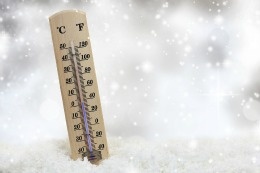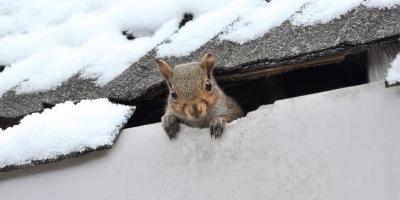How Some Insects Survive In Bitter Temperatures

Not too many life forms are suited to survive subfreezing temperatures -- insects included. Insects are exothermic (cold-blooded) and do not produce their own body heat. In order to survive the cold, many insects have adopted practices to ensure survival, or have even evolved in ways that change their chemical makeup for better protection against the cold.
Some Insects Simply Avoid The Cold
Just like the Canada Goose and many New England residents, certain insects survive the cold by flying south for the winter. Researchers have used tiny radio transmitters to determine that some types of butterflies and dragonflies will migrate south in large swarms as soon as the cold approaches. The North American monarch is the only butterfly known to make a two-way migration, however. Monarchs sense air currents and thermal changes to identify their destination, and can travel over 3,000 miles to reach central Mexico each winter.
Other insects avoid the cold by burrowing into the Earth’s soil or hiding under plant debris. While the air temperature fluctuates during the winter, the temperature underneath the cover of soil remains relatively stable, especially when the soil is insulated by a layer of snow. Bean leaf beetles, for example, will overwinter as mature adults, but are suited to survive temperatures of around only 20 degrees Fahrenheit. Beetles tend to overwinter under leaf litter where temperature changes are less volatile, allowing them to survive the otherwise frigid conditions. These insects prefer milder winter weather and temperatures, and are much more likely to survive forgiving winters.
Some Insects Can Simply Survive Freezing Temperatures
Just like polar bears, certain insects employ a strategy similar to hibernation to survive the cold winters. Insects like the emerald ash borer will enter a dormant state known as diapause until they thaw under the warmth of spring and resume their lives. During diapause, insects do not eat, move, or develop in any way; they simply exist. Many insects are able to survive freezing temperatures because of a high concentration of glycerol in their blood, which acts as an antifreeze.
In an even more impressive feat, some insects actually freeze. Goldenrod gall flies and wooly bear caterpillars will freeze like solid, frozen statues during the winter, and can survive temperatures that are well below any found naturally on Earth. While frozen, most of their bodily functions and processes shut down.
Of course, some bugs will wait out the cold temperatures by making themselves comfortable in your house. If you’ve noticed an influx of insects hibernating in your home, let JP Pest Services help. Our experienced professionals can get rid of insects from your home quickly and completely! Contact JP Pest Services to request a free residential estimate today!



